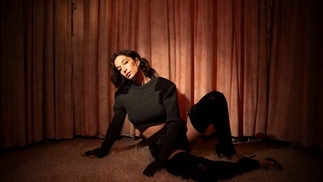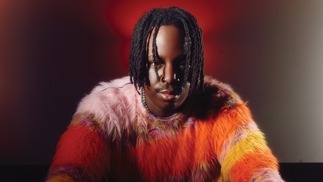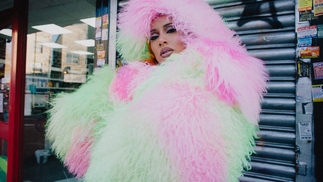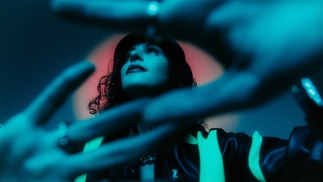Q&A: DJRUM
The garage/techno/jazz futurist on his new album 'Seven Lies'

Djrum lays down a different beat to most with his genre-trashing electronic tracks. Splicing garage and techno with his love of jazz and a crate digger's mentality, his debut album 'Seven Lies' stands out a mile from less distinguished bass cadets.
DJ Mag meets him to find out how vinyl plays a part in his productions, about his love of jazz — and what that name's all about... “The interesting thing is not the genres themselves but how they interact,” muses Felix Manuel over a crystal clear Skype line. “Not how they’re different but how they’re similar...” Known as Djrum, or at least he tries to be (it’s pronounced “Drum”, guys!) the Oxford-via-London producer and DJ has been a prominent blip on the radar since 2010, when the release of 'Plead With Me/Emerald (The Antidote)' on Smokin’ Sessions suggested a mutant strain of bass music was being synthesised somewhere south of the Thames.
Yet trying to impose a linear through-line from the slack and yawning dub of 2010’s 'St. Martin' to the ambitious, techno-thrust of 2011 EP 'Mountains' is fruitless. Instead, Manuel splices the DNA of techno, dubstep, garage and grime in an attempt to make them, in his words, “live inside each other”.
'Seven Lies', his recently released LP for independent 2nd Drop, home to South London Ordnance and Alex Coulton, is refreshingly out-of-sync with his post-dubstep peers; the organic textures and vinyl samples a studied throwback to the other '90s: boom bap and trip-hop, DJ Shadow and Madlib. But pay attention, as Manuel advocates, and you’ll notice smudges on the rose-tinted glasses.
Take 'Como Los Cerdos', it’s hardly the straightforward hip-hop track it first appears — the snares slightly off so that its swung rhythms evoke d&b with some of the sonic flourishes of jungle. “It’s about allowing yourself to listen to music elementally, you spit it out elementally as well.” Manuel explains. Indeed, these are the details that Manuel studies in order to grapple cliche to the floor and subvert it into off-beam, hybrid music. What we’re trying to say is it’s the kind of music you can only make if you really, really know your shit.
We caught up with this self-taught scholar of dance music who first began DJing jazz in his room to find out what exactly is going on in that brain — and that record collection — of his...
The most noticeable thing about your music is how unplaceable it is, there’s elements of many different genres in there but not in a cliched ‘chuck everything in and hope it sticks way’. How did your sound develop?
“When you start out producing it feels like the natural thing is to copy people. In the early days I was listening to people like Pinch and Mala and thinking, 'Why can’t I make tunes like that?' But when I started to look at my record collection and how diverse it is, I thought, yes I do want to sound like Pinch and Mala, but I also want to sound like all this hip-hop I have, or all this jazz I have, or all this Brazilian music I have.
At the time I was DJing and playing bass, ragga and jungle at squat parties, but by playing that sort of stuff I’d be ignoring the fact I was also into jazz. For me to suddenly say, 'Fuck it, I am into this music and I’m not going to pretend that I’m not' — that was the turning point.”
There’s a quality within your music, the use of hard-to-place samples, that implies a deep rooted knowledge of these styles, that it’s born of love, not extended YouTube sessions...
“The internet facilitates the listening to a really broad range of music and it invites you to dip your toe into something without reflecting on it. You could become a hip-hop expert through Wikipedia and YouTube, but does it mean you know shit-all about hip-hop? No, but it makes pastiche really accessible. For me vinyl is part of what I do. I still crate-dig all the time, and while not all the samples from the album are from vinyl, a big portion of them are. The difference between virtual crate-digging and physical crate-digging is massive. If you’re going to crate-dig jazz, you’ve got to know your shit!”
Wait, you got into dance music through jazz?
“I first got into DJing through jazz. I inherited a pile of jazz records from my mum back when I was mostly listening to trip-hop: '90s Ninja Tune, DJ Shadow.... I listened to the jazz, spotted some samples and realised that you could mix jazz with trip-hop totally seamlessly. From there I got into funk and soul, drum & bass.
I was recently looking through some old cassette tapes that I had, and I found a Janet Jackson tape from when I was a little kid, and it’s produced by J Dilla. You know he did that Janet Jackson tune 'Got ‘til it’s Gone'? I loved that tune. I also had this tape called 'The Mother of All Swing' album, that had a bunch of R&B on, so basically that’s sort of where I started when I was a kid. When I was growing up I always knew I liked hip-hop, but I didn’t know anyone else who liked it, all my mates took the piss out of me for liking it.”
One of your calling cards within your productions is the emotion you invest into the track. 'Seven Lies' is as much about the emotional tone within the grooves as the actual beats. Where does that come from?
“I’m quite a patient person. I like to get into the zone, not just when I’m making music, but when I listen to it too. I’m an intent listener and I love to listen to a 20-minute piece of music, and really get involved within it. I suppose listening to music really closely lends [itself] to a kind of introverted mood. That’s what I love about classical music, it’s designed for close listening. You go to classical concerts, there’s silence. If you hum along or get excited you’re frowned upon. I love that!”
When you’re in the studio, do you have an idea of the sort of person who might listen to your music?
“When I started putting out releases I found myself sitting down to make tunes knowing that they were going to be heard by a wider audience. That knowledge totally changed my approach. I suddenly found myself thinking, 'How would someone perceive this?' Sometimes I feel I have to make things easier for people, other times I want to challenge them. I don’t know who those people are, but I think about them. Often when I’m producing something, I may think it’s good, but maybe it wouldn’t make sense to a techno audience. I wonder, how do I make a hip-hop beat that translates to a techno audience? I’m trying to make one genre inside another, so I’ll create a noise, perhaps a typical techno noise and apply it to a hip-hop track so people think, 'That’s weird'.”
Finally, I’ve got to ask, what’s with your name?
“[Laughs] Fucking hell. Basically it’s pronounced “drum” but it used to be DJ Rum and I’m having trouble shaking it! People see it written and they just insert the space, they can’t see the difference. It’s written so many different ways on the internet I think it’ll take a while for it to settle down. It needs time.”





